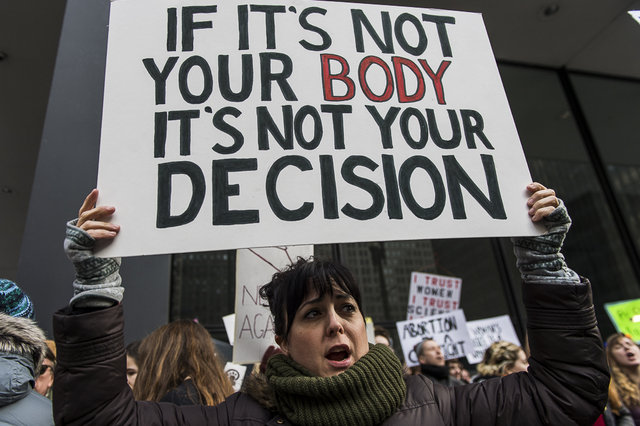Could An Obscure Illinois Law End Abortion Rights If Roe v. Wade Gets Overturned?
By Stephen Gossett in News on Feb 3, 2017 10:59PM

Photo: Tyler LaRiviere
Roe v. Wade is suddenly facing new threats, with a choice-hostile administration in office, a possibly pro-life conservative judge just nominated to the Supreme Court, and the potential for another vacancy looming. While the likelihood of a Roe repeal in the immediate future is up for debate, a law on the state books has some advocates alarmed that such a move could spell quick trouble here: Illinois has a so-called trigger law for abortion, meaning the instant Roe were to be repealed, all abortion in which the mother's life is not endangered could potentially cease to be legal in the state.
One of only a handful of states with such a law on the book, Illinois passed its measure just two years after the Supreme Court's landmark Roe v Wade decision. At the same time, some legal experts have argued that Illinois' trigger lacks real power. According to the Tribune, in 2006, laws like Illinois are "statements of policy, not actual bans," as noted by attorneys on either side of the debate. Illinois' law lacks specifics and the state's abortion ban that preceded Roe was repealed, the Trib notes.
Still, it’s a surprising statement, considering the abortion advocacy network that extends from the present moment (groups like the Midwest Access Coalition, which helps abortion seekers from more restrictive states come to Chicago) to decades back (the iconic Jane Collective helped provide the service to women in need in the early 1970s, when abortion was illegal.) And some Illinois lawmakers want a change of text regardless.
A bill in the Illinois state house, sponsored by Representative Sara Feigenholtz, would change the law and remove the trigger effect. (It would also remove provisions that outlaw insurance coverage for many women who use Medicaid or state providers.)
Given the current climate, advocates are arguing fiercely for its adoption. “There’s just way too much danger to have anything on our books that creates any doubt,” Lorie Chaiten, Director of the Reproductive Rights Project for ACLU Illinois, told Chicagoist. “Illinois has the opportunity to say we’re not going back.”
Some legal observers doubt that a Roe reversal is in the immediate or near-term future but still acknowledge the likelihood “increasingly onerous restrictions on abortion,” as Carolyn Shapiro, an associate professor at IIT Chicago-Kent College of Law and former Illinois Solicitor General, put it. “As long as those restrictions arise from other states' laws, the changes in precedent would probably not trigger the Illinois law.” Shapiro told Chicagoist by email. “More concerning is that Congress might impose restrictions, which would make it harder for Illinois to continue to protect its citizens' right to reproductive autonomy.”
“Bottom line: there is a lot to be concerned about for choice advocates, and the overruling of Roe is only one of those things,” she added.
Still, the removal of the trigger mechanism, however effective, is a common-sense fix, Chaiten contends. “There’s just way too much risk to have anything on our books that creates any doubt. And frankly, it’s a great opportunity to say ‘This is who we are, and we’re not going to sell women out,” said Chaiten, who said the bill appears to be garnering more interest, both among the public and with legislators.
Nevertheless, pro-choice lawmakers are arguing for vigilance and urge constituents to contact their state representatives. "We're going to fight to the end on this," Feigenholtz said of the bill, via the Sun-Times.
This post has been updated.